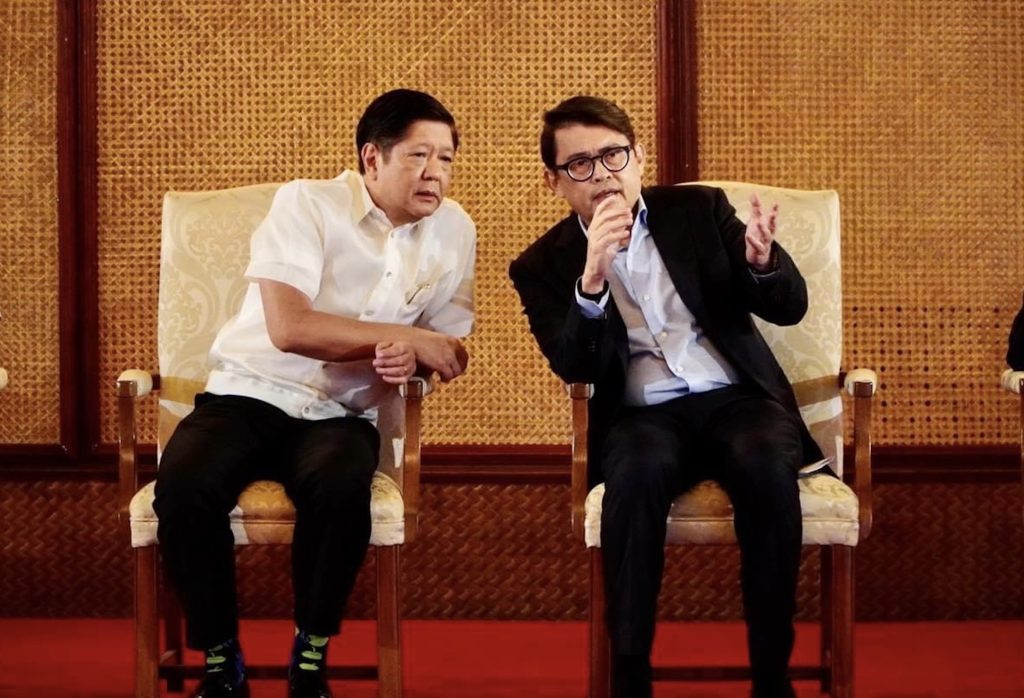
Concepcion Bares SGS Offer to Inspect PH Agri Imports
April 12, 2023
With Help, Yes, The Filipino Farmer Can
April 24, 2023
A Meeting of Minds
Shortly after Ferdinand Marcos Jr. became the clear winner in last year’s presidential elections, I sat down with him at his campaign headquarters in Mandaluyong. Prior to this meeting, he and I had never really sat down for a chat. We would see each other in fleeting social encounters, but had mainly only heard of each other, be it through common friends, in our own respective advocacies and profession, through our children and, of course, by reputation.
Clearly, I was not the only one who was curious about him back then. When he appeared as our featured presidential candidate on our Go Negosyo show “Kandidatalks,” that episode reached more than one million people and attracted 379,000 total views when it streamed live over Go Negosyo’s Facebook page in December 2021.
Almost a year on, as I got to know the President through our meetings and on official trips abroad, I realized how similar our vision is for the country’s MSMEs.
Foremost is his giving MSMEs their due place as champions of our economy, especially in job creation. MSMEs are 99 percent of the enterprises in the Philippines, contributing almost 65 percent of jobs here in the country and accounting for more than a third of its GDP. Growing our MSME sector will widen our economy’s base so that it can no longer be affected by the performance of its large companies or a pause in government spending.
We are also aligned in seeing how digitalization can help our MSMEs.
The pandemic pushed Filipinos to acquire e-wallets and this was key to taking digitalization to the next level: a cashless society that has long been promoted by our financial managers. We saw so many MSMEs thrive and new ones being born during the pandemic, driven and aided by the rapid rise of digital payments. With digitalization, these small enterprises enjoyed an even playing field with the big players, able to push their products to their communities and equipped to receive payments and overcome roadblocks that used to stand between them and payments. We saw how digital money and market platforms created more access for entrepreneurs to sell their products and services.
Since many Filipinos remain unbanked – about 44 percent of adult Filipinos as of 2021, according to the BSP – and therefore have no access to credit cards, the e-wallets like GCash and Maya, and the many joining their ranks, have their place in helping spur digitalization and financial inclusion in our country.
The President early on also saw how local government units play a major role in helping MSMEs. He proposed allocating a portion of the Internal Revenue Allotments of LGUs to fund projects for MSMEs. This is prescient as when we started putting together the framework for the Kapatid Angat Lahat Agri Program, LGU cooperation emerged as a key component in helping our small farmers become agripreneurs.
Agriculture is where we truly had a meeting of minds. The agriculture sector accounts for a quarter of the total number of jobs here in the Philippines. Couple that with the number of jobs contributed by MSMEs, then it stands to reason that helping the small agripreneurs will redound to so many benefits not just in food security and sustainability, but also in job generation.
The President also said he wants to help farmers get access to credit. Agriculture is a risky venture, and our farmers are poorly equipped to mitigate their own risks and convince the banks to lend to them. It also doesn’t help that those who need credit the most have the least access to it – literally and figuratively, as our far-flung provinces have yet to even have ATMs in their communities, least of all an actual physical branch where farmers can easily apply for and pay off their loans.
From our meetings with the banks as part of our KALAP initiative, there is clearly much that needs to be done to improve farmers’ access to credit. We are willing to meet them halfway through KALAP. With hope, and with the big brothers in agriculture on their side, small farmers will have the confidence of the banks and lending institutions enough to ease access to credit. This will enable farmers to scale and increase productivity and, over time, build their credit rating.
The President also saw the need to rationalize the tax system to protect the MSMEs. From my conversations at Go Negosyo with the active and aspiring small entrepreneurs during our mall-based entrepreneurship mentoring roadshow 3M on Wheels, I could tell that the MSEs want to be part of the formal economy.
They have very little reason not to, because they understand that in order to grow their businesses, they need the documentary requirements that will allow them to get the capital they need to increase production, or even open a bank account to enable them to make bigger transactions. Clearly, facilitating the ease of doing business for MSEs will help make them part of the taxable economy, further increasing their contribution to our country. It is something that I believe the President and I both saw as an obvious truth.
The President went on to say that MSMEs must be encouraged to grow, to set their goals to go beyond just making money and realize their role in social transformation. Our role in the private sector is to help ease the way for them.

2/F RFM Corporate Center, Pioneer cor. Sheridan Sts. Mandaluyong City, Metro Manila, Philippines

